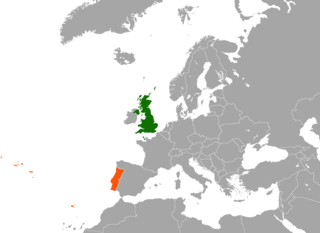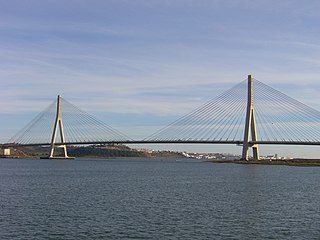The Treaty of Lisbon , if the date is unspecified, usually refers to a 2007 treaty between member states designed to reform the European Union.
Treaty of Lisbon may also refer to:

DomPedro II, nicknamed "the Pacific", was King of Portugal from 1683 until his death, previously serving as regent for his brother Afonso VI from 1668 until his own accession. He was the fifth and last child of John IV and Luisa de Guzmán.

The Anglo-Portuguese Alliance is the oldest alliance based on known history in the world that is still in force by politics. It was established by the Treaty of Windsor in 1386, between the Kingdom of England and the Kingdom of Portugal, though the countries were previously allied via the Anglo-Portuguese Treaty of 1373.

Olivenza or Olivença is a town in southwestern Spain, near the Portuguese border. It is a municipality belonging to the province of Badajoz, and to the wider autonomous community of Extremadura.
Lisbon is the capital city of Portugal.
Expresso may refer to:
Treaty of Madrid may refer to:
Spanish–Portuguese War may refer to one of the following conflicts between Portugal and Spain :

From the restoration of the House of Braganza in 1640 until the end of the reign of the Marquis of Pombal in 1777, the Kingdom of Portugal was in a period of transition. Having been near its height at the start of the Iberian Union, the Portuguese Empire continued to enjoy the widespread influence in the world during this period that had characterized the period of the Discoveries. By the end of this period, however, the fortunes of Portugal and its empire had declined, culminating with the Távora affair, the catastrophic 1755 Lisbon earthquake, and the accession of Maria I, the first ruling Queen of Portugal.

The Portuguese Restoration War was the war between Portugal and Spain that began with the Portuguese revolution of 1640 and ended with the Treaty of Lisbon in 1668, bringing a formal end to the Iberian Union. The period from 1640 to 1668 was marked by periodic skirmishes between Portugal and Spain, as well as short episodes of more serious warfare, much of it occasioned by Spanish and Portuguese entanglements with non-Iberian powers. Spain was involved in the Thirty Years' War until 1648 and the Franco-Spanish War until 1659, while Portugal was involved in the Dutch–Portuguese War until 1663.

The Battle of Montes Claros was fought on 17 June 1665, near Borba, between Spanish and a combined Anglo-Portuguese force as the last major battle in the Portuguese Restoration War. The battle resulted in a decisive Portuguese victory and is considered one of the most important battles in the country's history.
The Treaty of Lisbon of 1668 was a peace treaty between Portugal and Spain that was concluded at Lisbon on 13 February 1668 with the mediation of England in which Spain recognised the sovereignty of Portugal's new ruling dynasty, the House of Braganza.

British–Portuguese relations are foreign relations between Portugal and the United Kingdom. The relationship, largely driven by the nations' common interests as maritime countries on the edge of Europe and close to larger continental neighbours, dates back to the Middle Ages in 1373 with the Anglo-Portuguese Alliance. The two countries now enjoy a friendly and close relationship.

The relations between the governments of the Portuguese Republic and the Kingdom of Spain enjoy a friendly relationship. Together, they are full-time members of the Ibero-American Summit, European Union, Eurozone, Schengen Area and NATO. The two states make up the vast majority of the Iberian Peninsula and as such, the relationship between the two is sometimes known as Iberian relations.

The Castle of Alcoutim is a medieval castle in the civil parish of Alcoutim, in the municipality of the same name, in the southeastern Algarve of Portugal. Built in the 13th century, the castle stands in a dominant position on a hill south of the parish seat of Alcoutim on the right bank of the San Marcos River, opposite the territory of Sanlúcar de Guadiana.

The Castle/Fortress of Almeida is a castle situated in the civil parish of Almeida, in the municipality of Almeida in the Portuguese district of Guarda, in the former-northwestern province of Beira Alta. It was constructed in this region due to its significant strategic importance, due to its close proximity to the border between Portugal and Spain. It is classified as a National Monument. The 1810 explosion: The magazine which was the seat of the explosion was in the cathedral adjacent to the castle, not the castle itself as reported in the text.

The Treaty of Lisbon was signed on 31 March 1667 by Portugal and France, which agreed to a ten-year defensive and offensive alliance against Spain. The treaty was driven by Louis XIV, who was preparing to seize the Spanish Netherlands. The Portuguese Restoration War, which had begun in 1640, was coming to an end. Ensuring that it continued would absorb Spanish resources and prevent Spain from sending reinforcements.
Lisbon Agreement may refer to:

The Portugal–Spain border, also referred to as "The Stripe", is one of the oldest borders in the world. The current demarcation is almost identical to that defined in 1297 by the Treaty of Alcañices. The Portugal–Spain border is 1,214 km (754 mi) long, and is the longest uninterrupted border within the European Union, being free of border control since March 26, 1995, with the exception of a brief period during the COVID-19 pandemic. The border is not defined for 18 km (11 mi) between the Caia river and Ribeira de Cuncos, because of the disputed status of Olivenza/Olivença, which has been disputed between the two countries for two hundred years.

The Treaty of Madrid, also known as The Earl of Sandwich's Treaty, was signed on 23 May, 1667 by England and Spain. It was one of a series of agreements made in response to French expansion under King Louis XIV.

France–Portugal relations are the current and historical relations between France and Portugal. Both nations are members of the Council of Europe, European Union, NATO, Organisation for Economic Co-operation and Development, Union for the Mediterranean and the United Nations.